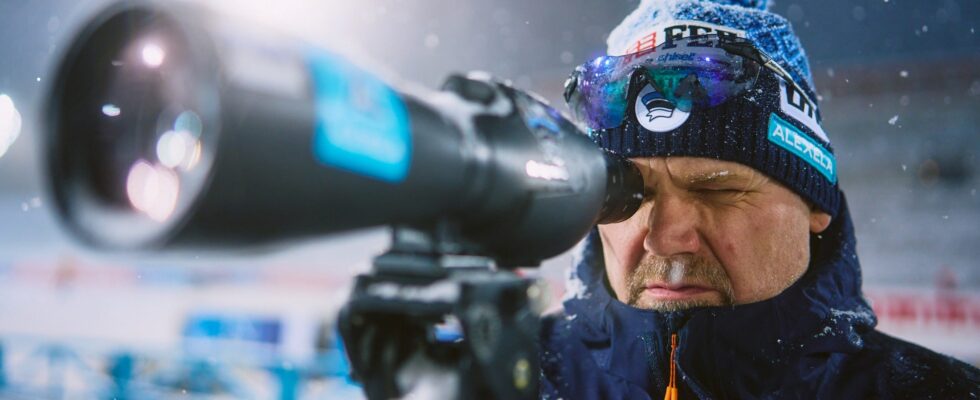Stefan Lindinger dared to jump into the deep end. In spring 2023 he took on the role of head coach of a biathlon team for the first time. After his first season it is clear: the risk was worth it, the Salzburg native celebrated great success with Estonia.
A look at Stefan Lindinger’s CV reveals: This man has experienced a lot. And there’s a lot more to come. He was a professor at the University of Rif for 24 years. For several years he held a professorship at the University of Gothenburg. In the 90s he worked with Thomas Muster, the former number one in the tennis world rankings. For several years he was one of the supervisors of ex-tennis ace Barbara Schett. For his dissertation, the Salzburg resident once cooperated with the Norwegian Ski Association and analyzed the technique of cross-country skiing superstars such as Bjørn Dæhlie (eight-time Olympic champion and nine-time world champion) and Thomas Alsgaard ( five-time Olympic champion, six-time world champion).Lindinger: “Role as head coach appealed to me” Under coaching legend Wolfgang Pichler, he was part of the support staff for the Russian biathletes, but left the team before the 2014 Olympic Games in Sochi. Lindinger also implemented various projects with numerous local winter sports enthusiasts. Last winter he ventured into new territory. “The role as head coach appealed to me,” reveals the 55-year-old, who played tennis as a child and teenager, was a good ski racer and later switched to Nordic skiing (cross-country skiing, biathlon). . It was a good thing that exactly this role was available in Estonia. “This is a very sporty country with around 1.3 million inhabitants and a very good sports structure,” he says. The Balts have had nothing to report in biathlon in recent years, but he identified “a middle class nation with potential. That’s why I was interested. Even if I wasn’t 100 percent clear about what to expect.”In May 2023, he traveled to Otepää, looked at the conditions on site – and signed a contract. “That’s when I turned the story around. “I used to be a university professor, now I’m a head coach,” grins the East Tyrolean native. “I always believed I could do this job,” he emphasizes, before admitting: “It wasn’t easy.” Strength shown – a lot of energy invested The first summer preparation with the Estonians immediately became a test. There have been repeated tensions among the athletes in recent years; not all of them train under the leadership of the association. Lindinger had to take tough action and show strength. That earned him respect, but it also cost him a lot of energy. The fact that the majority of his team was also sick with Corona at the start of the season and the hoped-for sporting recovery initially failed to materialize contributed to a complicated start in a new role. But Lindinger believed in the new path, in his idea. And should reap the first successes as the season continued. His team, which has significantly less budget and manpower than the Austrian team, really got rolling at the highlight of the season at the Biathlon World Championships in Nove Mesto na Morave, Czech Republic. “We did a great job in the last three weeks before the World Cup,” he says, proud that the Estonians managed to build up their perfect form. This is anything but a “gmahte Wiesn”. “It’s a science; I thought carefully in advance about what we had to do. But you also need the necessary luck for the training to work. “It worked extremely well for us,” he says proudly. The fact that the service people also did an excellent job and that the Estonians had fast skis under their feet was another important building block on the road to success. “Biathlon is the most important winter sport” Tuuli Tomingas and Regina Ermits, until then at best fellow runners, grew up in the Czech highlands beyond yourself. In the women’s relay, Estonia was on course for a medal for a long time and ultimately ended up in fourth place. A historic success, after all, the ladies have never been nearly as competitive before. The enthusiasm among the rather cool northern Europeans was huge. Not only were there numerous media representatives on site – in contrast to Austria – there was also a lot of excitement at home. “Biathlon is the absolute most important winter sport in Estonia,” explains Lindinger. “Almost all World Cups have live television. I constantly had press appointments, which I wasn’t used to at all.” Things haven’t really gotten any quieter in the last few weeks. The Estonians definitely want to continue working with Lindinger. The 55-year-old, who flew under the radar in this country for a long time (“Many people don’t even know that I work in Estonia”), can easily imagine staying. Given the Estonian successes, however, it cannot be ruled out that other associations will join Report it to him – and the jack-of-all-trades’ CV will be enriched by another chapter.
source site-12
